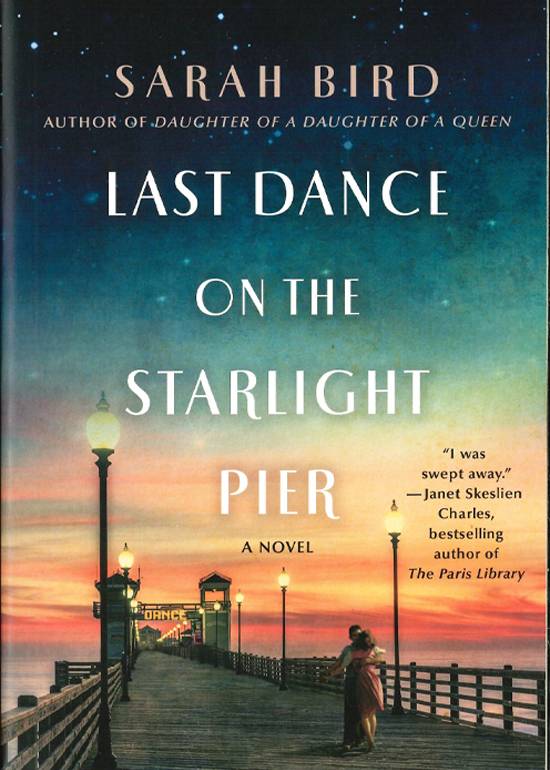
Last Dance on the Starlight Pier
by Sarah Bird
New York: St. Martin’s Press, 2022.
426 pp. $28.99 Hardcover.
Reviewed by
Steph Grossman
“Bestselling author Sarah Bird’s latest novel is a Depression-era fairy tale about Texas, vaudeville, and the Mob. The book contains no literal witches, princesses, or talking animals, but nevertheless Last Dance on the Starlight Pier is suffused with the spirit of the Brothers Grimm.”
Bestselling author Sarah Bird’s latest novel is a Depression-era fairy tale about Texas, vaudeville, and the Mob. The book contains no literal witches, princesses, or talking animals, but nevertheless Last Dance on the Starlight Pier is suffused with the spirit of the Brothers Grimm. The protagonist, Evie Grace Devlin, comes from royalty—of the vaudeville variety. She’s the daughter of legendary dancer Denny Devlin, a man of King Arthur-like fame in the novel’s world of 1930s variety shows. Unfortunately for Evie, her father dies when she’s a child, leaving the dance princess at the mercy of her mother, Mamie—a woman so vile, she’s worthy of a wicked stepmother title. Though Last Dance spans across Texas, up to Chicago, and back, Evie’s story begins and ends in Galveston, a place darkly enchanted by bootlegging and vice. Thanks to the Amadeo crime family’s Mob-rule, Galveston is one of the few places untouched by the Great Depression. Hope for Evie arrives in the form of a scholarship to nursing school—and in the form of a friendship with Sofie Amadeo. Sofie becomes a fairy godmother figure for Evie. With the snap of her fingers, Sofie and her powerful family can make things happen for Evie—until they can’t anymore, and Evie must find another way to make her dreams of becoming a nurse come true.
Most importantly, fairy tales involve a happily ever after—and Evie eventually does receive one—just not in the way you’d expect. Evie experiences a great deal of darkness before she reaches that happy ending. Her trials begin when her burlesque past is discovered by the director of her nursing program, who refuses to award Evie a coveted nursing pin certification despite her stellar test scores. As a child, Evie’s mother forced her to perform in a peep show under the name of the “Pint-Sized Pavlova.” For some, the portrayal of this traumatic memory may be triggering, but it’s an essential piece of Evie’s past—one that helps us understand the decisions she makes later in the book.
To make ends meet, Evie returns home and becomes an off-the-books nurse at a local marathon dance hall, only to eventually get wrapped up in becoming a performer yet again. She becomes dance partners with the stunningly handsome and talented Zave Cassidy, and to her (and everyone else’s) shock, he seems to have taken a romantic interest in her.
Bird’s extensive research on the dance marathons that took place across America during the Great Depression shows to great effect. It was a wildly popular form of entertainment at the time—one that required its contestants to dance in pairs for days on-end for a cash prize. Contestants were even required to keep dancing while they slept, with one dancer holding up their sleeping partner. Bird portrays the marathons in a way that’s reminiscent of reality television. The audiences tune in every night, rooting for their favorite pair, and watching the drama between the dancers unfold.
While the marathons radiate with glamor, Bird portrays the grim realities of the Depression, especially when Evie visits West Texas to see her grandmother. Vivid, unforgettable scenes include Evie finding her grandmother nearly dead from inhaling so much dust it’s turned to sludge in her lungs and the barbaric jackrabbit hunt that Evie witnesses. (These hunts were a real pest-control practice that occurred in many Dust Bowl towns.) Such harrowing sequences are beautifully wrought, and Bird makes the pure desperation and despair of these impoverished, isolated characters extremely palpable.
Evie’s nursing talents allow her to save her grandmother and continue her work with the marathoners. As hers and Zave’s dancing takes them to Chicago and then back to Galveston, Evie lets her guard down, allowing herself to develop feelings for Zave, who seems just as smitten with her. But soon, Evie finds out something that brings all of her fantasies to a halt: Zave is gay.
This is where the book rouses into a love story you don’t usually see, for it is Evie’s misguided hopes that drive Last Dance forward. Bird creates a relationship between Evie and Zave that effectively captures something beyond mere friendship. Their bond is similar to that of siblings, yet deeper. It’s found family, and more—the kind of love and devotion that allows you the strength and patience to dance together for literal days, suffering pain and exhaustion, going squirrelly from lack of sleep, all while steadfastly holding each others’ bodies—and spirits—up high.
Last Dance has character depth possible only in a novel and combines it with the vivid, pepped-up pace of a film. For readers who enjoy unconventional love stories and learning about lost subcultures of American history, this novel will enlighten as well as delight.
Steph Grossman’s fiction has appeared in Joyland, CRAFT, and Salamander and has been recognized in contests with The Masters Review and Fractured Lit. Her narrative nonfiction has appeared in Paste Magazine and in The Masters Review. For about a decade, she worked in NYC publishing at Simon & Schuster, Penguin Random House, and JSTOR, but she moved to Texas in 2019 to pursue her MFA in creative writing at Texas State University. She now lives in the Austin area and works as an Assistant Professor of Instruction in the English department at Texas State. A devotee of horror and the gothic, Steph also co-hosts the Basement Girls Podcast with poet Bianca Pérez where they take an academic approach to reviewing film and literature across the horror and mystery genres.
